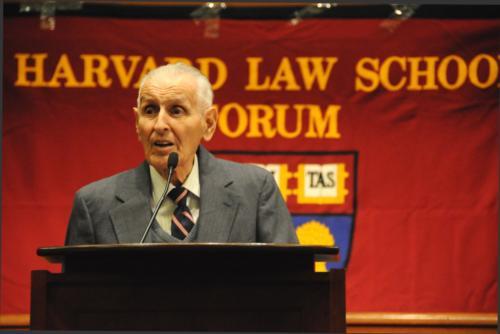
News
Summers Will Not Finish Semester of Teaching as Harvard Investigates Epstein Ties

News
Harvard College Students Report Favoring Divestment from Israel in HUA Survey

News
‘He Should Resign’: Harvard Undergrads Take Hard Line Against Summers Over Epstein Scandal

News
Harvard To Launch New Investigation Into Epstein’s Ties to Summers, Other University Affiliates

News
Harvard Students To Vote on Divestment From Israel in Inaugural HUA Election Survey
Kevorkian Speaks To HLS Audience

Jack Kevorkian, whose public championing of the legalization of medical euthanasia has earned him the moniker “Dr. Death,” attacked medical organizations and the Supreme Court in a speech at Harvard Law School yesterday.
After being convicted of second-degree murder for assisting terminally ill patients to commit suicide, Kevorkian, a former pathologist, served in prison for eight years before being released on parole in 2007.
Kevorkian said he uses the 9th Amendment, which addresses civil rights not specifically enumerated in the Constitution, as the basis for his belief in a patient’s right to die.
Last week, Supreme Court Justice Antonin Scalia made a dismissive remark about the 9th Amendment when taking questions from the audience during a lecture at the Law School.
But Law School professor Alan M. Dershowitz, who introduced Kevorkian, argued that the 9th Amendment is an important component of the Bill of Rights.
“It was not a joke to [James] Madison, and it should not be a joke to a justice of the United States Supreme Court,” Dershowitz said.
In his speech, Kevorkian called the Supreme Court “nincompoops.”
“We need a system of deliberation by wise people, and the Supreme Court is not wise,” Kevorkian said.
Kevorkian remained adamant that the actions leading to his imprisonment were morally justifiable, saying that all the patients whom he helped to die “deserved the service.”
In response to a question on Oregon’s assisted suicide law, Kevorkian said
that medical euthanasia should be conducted like every medical service, with an extensive consultation process, as with a heart transplant.
“We have medical guidelines, and it must be absolutely informed consent,” he said.
The terms of his parole, however, include a stipulation that he refrain from giving advice to patients seeking assisted suicide.
Instead of returning to medical practice, Kevorkian said he will work to legalize assisted suicides for the next generation of doctors. He is currently running in Michigan for a seat in the House of Representatives.
Kervorkian also spoke at length on what he said he perceived as the dishonesty, lack of discipline, and undercurrent of fear in modern society. Departing from the stated topic of his talk, he compared the wars in Iraq and Afghanistan to the actions of the Nazis.
One audience member said he fundamentally agreed with Kevorkian’s views on civil liberties, in spite of the politically unpopular conclusions that the former doctor drew.
“I don’t disagree with his arguments,” said Neto Waite, an LLM student at the Law School.
“As to whether I would have the courage to agree with all of them is a different story,” he added.
—Staff writer Athena Y. Jiang can be reached at ajiang@fas.harvard.edu.
Want to keep up with breaking news? Subscribe to our email newsletter.
